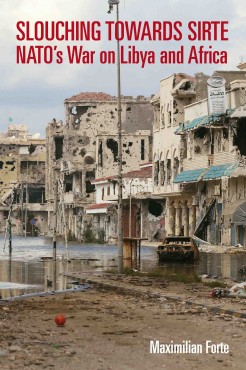|
|
Post by nebsen on Apr 17, 2019 20:43:29 GMT -5
Africa is back in the news of late some bad Some good...Climate change & it's affect on Africa Today !
|
|
|
|
Post by nebsen on Apr 19, 2019 21:02:15 GMT -5
More news!
|
|
|
|
Post by zarahan on Apr 20, 2019 9:52:23 GMT -5
The drone operations seem a continuing American militarization of parts of the continent. One writer, Max FOrte argues that the Libyan invasion was part of that militarization- designed to quash a too independent Khadaffi, with his several Pan-Africanist initiatives, including his currency initiatives. Per your video, more drone operations are originating out of Africa than the Middle East. It cost $100 million to build one of those US drone bases in Niger, yet another video shows people of the same region suffering and starving in harsh desert conditions. The same or less money could have been spent on a network of water wells, windpower generators, medicine and livestock upgrading that would actually help tens of thousands of people now on the ground. -------------------------------------------------------------------------  www.barakabooks.com/catalogue/slouching-towards-sirte/ www.barakabooks.com/catalogue/slouching-towards-sirte/Slouching Towards Sirte NATO's War on Libya and Africa REVIEW ------------------------------ “Forte’s book is a must-read for anyone seriously interested in understanding the motives and consequences of the West’s onslaught against Libya and African development.” Dan Glazebrook, Ceasefire Magazine NATO’s war in Libya was proclaimed as a humanitarian intervention—bombing in the name of “saving lives.” Attempts at diplomacy were stifled. Peace talks were subverted. Libya was barred from representing itself at the UN, where shadowy NGOs and “human rights” groups held full sway in propagating exaggerations, outright falsehoods, and racial fear mongering that served to sanction atrocities and ethnic cleansing in the name of democracy. The rush to war was far speedier than Bush’s invasion of Iraq. Max Forte has scrutinized the documentary history from before, during, and after the war. He argues that the war on Libya was not about human rights, nor entirely about oil, but about a larger process of militarizing U.S. relations with Africa. The development of the Pentagon’s Africa Command, or AFRICOM, was in fierce competition with Pan-Africanist initiatives such as those spearheaded by Muammar Gaddafi. libya_nato_airstrikes_04-low-res-275x183Far from the success NATO boasts about or the “high watermark” proclaimed by proponents of the “Responsibility to Protect,” this war has left the once prosperous, independent and defiant Libya in ruin, dependency and prolonged civil strife. About humanitarian imperialism, Max Forte writes: “Desperate to finally be seen as the liberators of Arabs, rescuing poor victims with the finest of American exports (human rights), some would understandably feel compelled to exploit the suffering of others (residents fleeing Sirte) and turn that into something worthy of celebration. This is an example of the abduction process at the centre of Western, liberal humanitarianism: it can only function by first directly or indirectly creating the suffering of others, and by then seeing every hand as an outstretched hand, pleading or welcoming. We see (or imagine) helpless others, gobbling morsels of food that we hand them, brown mouths chugging down water from our plastic bottles, and we feel accomplished. Our moral might is reaffirmed by the physical plight of others. Clearly, the humanitarian relation is not a relation between equals. We are not our “brothers’ keepers” then, but rather we are more like animal keepers. Bombing for us is really just an animal management technology, and our relationship to the world remains a zoological one.” (Slouching Towards Sirte, p. 97. |
|